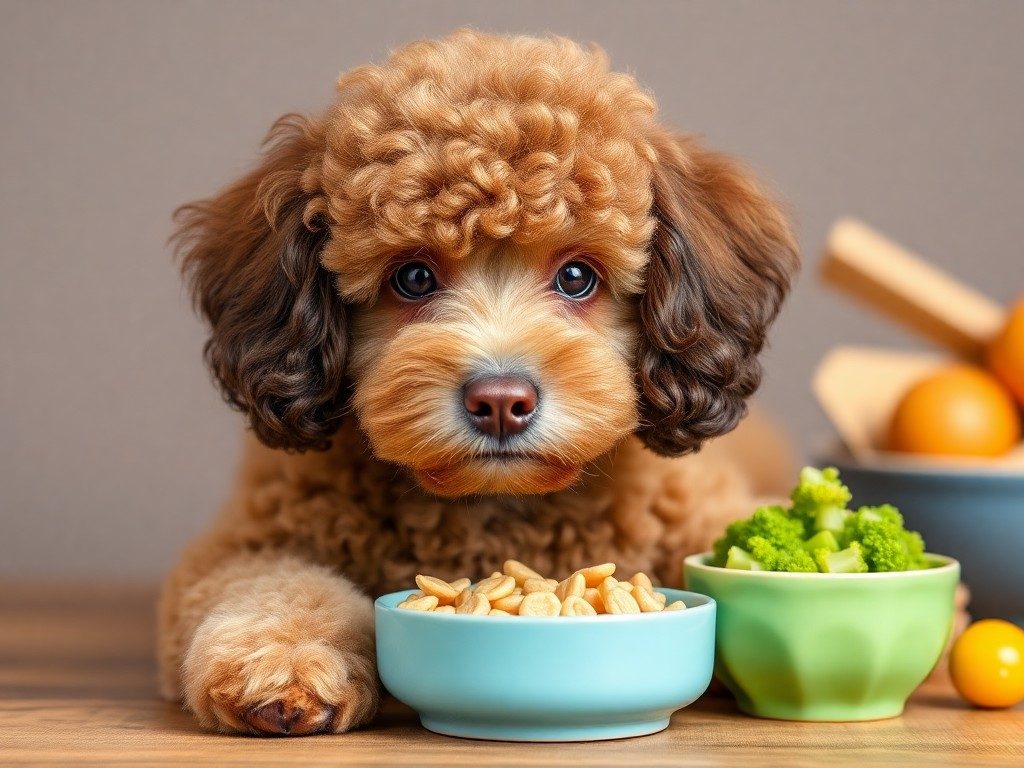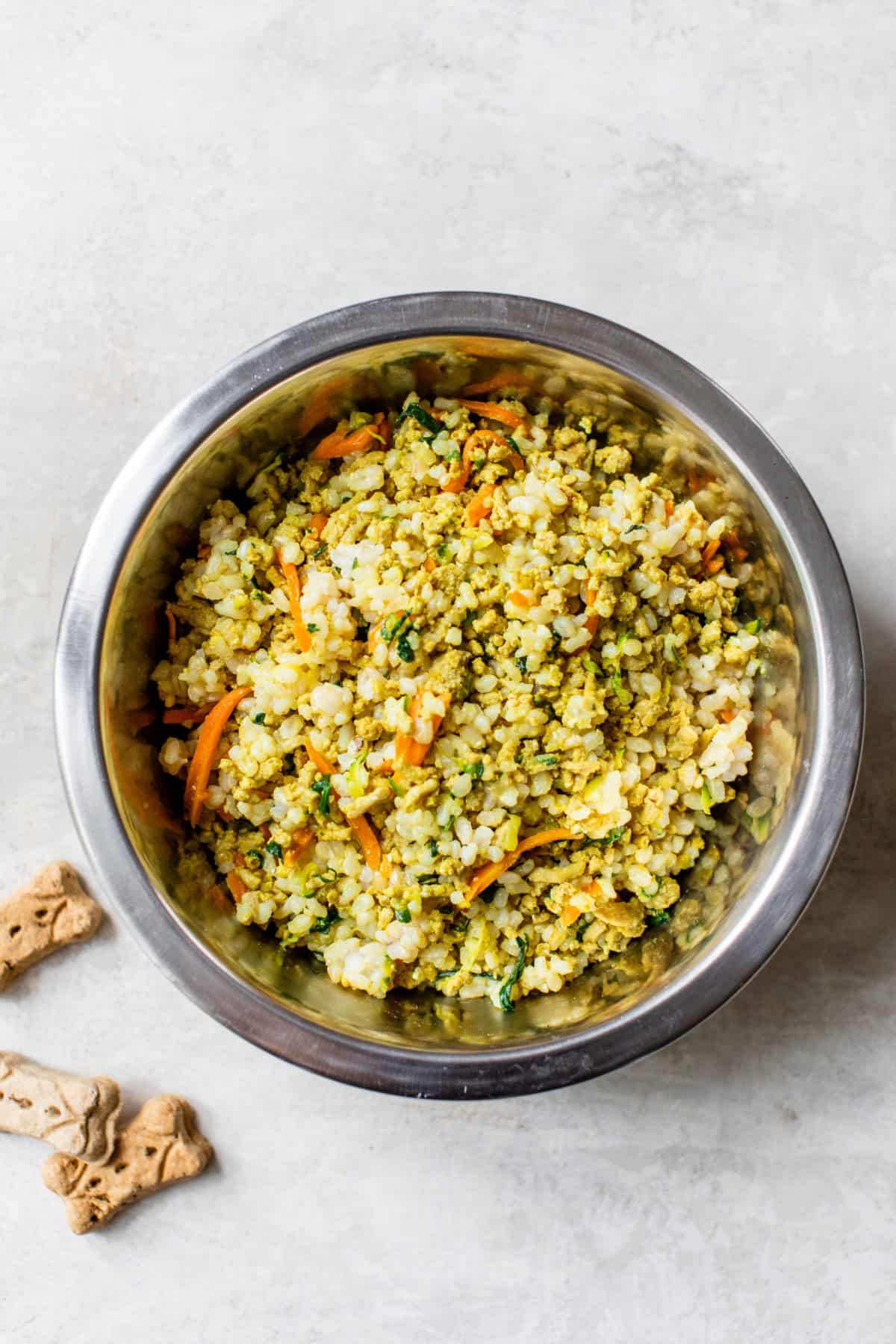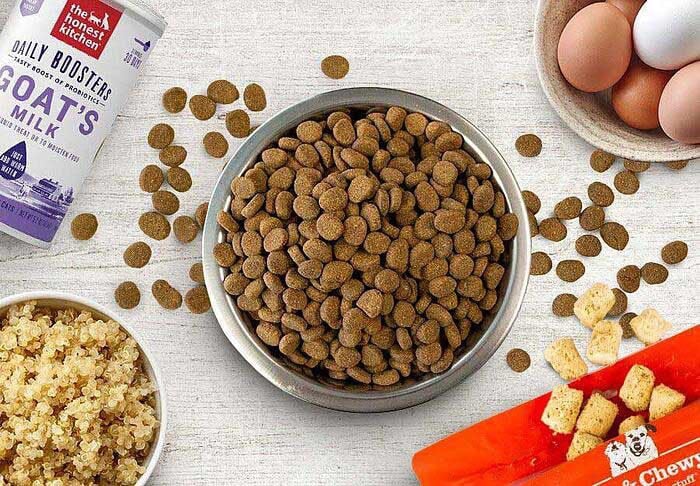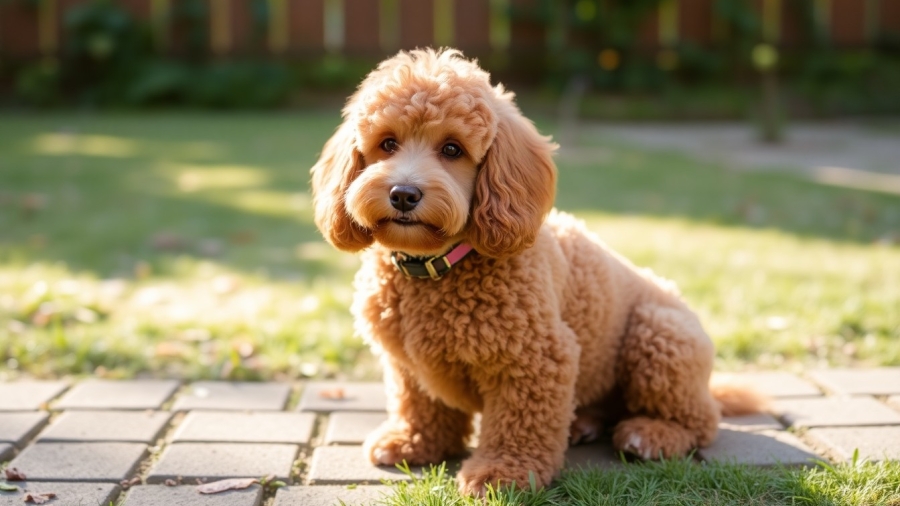Is your poodle underweight? Concerned about their health and energy levels?
You can help your furry friend gain weight with some simple and delicious tips. Poodles are active and elegant dogs that sometimes struggle with maintaining a healthy weight. Whether due to picky eating habits or a fast metabolism, it’s essential to ensure your poodle is getting the right nutrients and calories.
This blog will guide you through easy and tasty ways to help your poodle gain weight. We’ll explore nutritious food options and feeding strategies to help your poodle thrive. So, let’s dive in and discover how you can make mealtime enjoyable and beneficial for your beloved pet.

Importance Of A Healthy Weight
A healthy weight is crucial for your poodle’s overall well-being. Maintaining an ideal weight helps your poodle lead a longer, more active life. It also reduces the risk of various health issues.
Ensuring your poodle has the right weight supports their immune system. It also improves their energy levels, making them happier and more playful.
Signs Of Underweight Poodles
Recognizing if your poodle is underweight is important. Here are some signs to look out for:
- Visible ribs and backbone
- Lack of muscle mass
- Dull coat and shedding
- Low energy levels
- Reluctance to play
Health Risks Of Being Underweight
Underweight poodles face various health risks. These include:
- Weakened immune system
- Higher susceptibility to infections
- Decreased muscle strength
- Organ failure
- Bone fractures
Keeping your poodle at a healthy weight is vital. It prevents these risks and promotes a better quality of life for your pet.

Consulting A Veterinarian
Sometimes, getting your poodle to gain weight can be a challenge. If you have tried different methods and nothing seems to work, it might be time to consult a veterinarian. Your vet can provide professional advice and identify any underlying health issues that could be affecting your dog’s weight.
When To Seek Professional Help
Knowing when to seek professional help is crucial. If your poodle has lost weight suddenly or is not gaining weight despite eating well, you should contact your vet. Also, if you notice any other symptoms like vomiting, diarrhea, or lethargy, these could be signs of a more serious issue.
- Sudden weight loss
- No weight gain despite good appetite
- Other symptoms like vomiting or diarrhea
What To Expect During The Visit
During the visit, the vet will perform a thorough examination. This may include checking your poodle’s teeth, gums, and overall health. They will ask about your dog’s diet, exercise, and any recent changes in behavior.
| Examination | Details |
|---|---|
| Physical Check | Teeth, gums, and overall health |
| Diet Inquiry | Current food and feeding schedule |
| Behavioral Changes | Recent changes in activity or habits |
The vet might also suggest some diagnostic tests. These could include blood tests, stool tests, or even x-rays. The goal is to rule out any health problems that might be causing the weight issues.
- Blood tests
- Stool tests
- X-rays
After identifying the problem, the vet will recommend a treatment plan. This could involve dietary changes, supplements, or medications. Follow their advice closely to help your poodle gain weight healthily.
Choosing Nutritious Foods
Choosing the right foods for your poodle is essential for healthy weight gain. In this section, we will cover the importance of nutritious foods. We will break down the key components that should be part of your dog’s diet. Let’s explore high-quality protein sources and healthy fats and oils.
High-quality Protein Sources
Protein is vital for your poodle’s muscle development and overall health. Here are some excellent protein sources:
- Chicken: Lean and easily digestible.
- Turkey: Rich in protein and low in fat.
- Beef: Provides essential amino acids.
- Fish: High in Omega-3 fatty acids.
- Eggs: Packed with protein and nutrients.
Ensure the protein sources are cooked and boneless. Avoid processed meats that contain additives and preservatives.
Healthy Fats And Oils
Healthy fats are crucial for energy and skin health. Here are some beneficial fats and oils:
- Fish Oil: Rich in Omega-3 fatty acids.
- Coconut Oil: Supports digestion and immune system.
- Olive Oil: Boosts energy and promotes a shiny coat.
- Flaxseed Oil: Contains Omega-3 and Omega-6 fatty acids.
- Chicken Fat: Adds flavor and calories to meals.
Add these oils to your poodle’s diet in small amounts. This ensures they get the benefits without overloading their system.
Incorporate these nutritious foods into your poodle’s diet. This will help them gain weight in a healthy way.
Meal Frequency And Portions
Feeding your poodle the right amount of food at the right times is key for weight gain. Adjusting meal frequency and portion sizes can make a big difference in your dog’s health. Let’s dive into the details.
Optimal Feeding Schedule
Creating an optimal feeding schedule helps your poodle gain weight. Dogs thrive on routine. Feeding them at the same times every day helps. Consider splitting their daily food intake into multiple smaller meals.
Here’s a simple feeding schedule:
| Meal | Time |
|---|---|
| Breakfast | 7:00 AM |
| Lunch | 12:00 PM |
| Snack | 3:00 PM |
| Dinner | 7:00 PM |
Feeding four smaller meals a day can be easier on your poodle’s digestion. It also helps with nutrient absorption.
Adjusting Portion Sizes
Portion size is just as important as frequency. You need to ensure your poodle gets enough calories.
Here are some tips to adjust portion sizes:
- Start Small: Increase portions gradually to avoid stomach upset.
- Measure Food: Use a measuring cup to ensure accuracy.
- High-Calorie Treats: Add healthy, high-calorie treats between meals.
Consider using a calorie calculator for pets. This helps you determine the right amount of food for weight gain.
Over time, monitor your poodle’s weight and adjust portions as needed. Regular vet visits can provide more insights.
Incorporating Treats
Incorporating treats into your poodle’s diet can help them gain weight. Treats can be a fun and effective way to add calories. Just be sure to choose healthy options. Let’s explore some simple and delicious treat ideas.
Healthy Homemade Treats
Homemade treats allow you to control the ingredients. This ensures your poodle gets the best nutrition.
- Peanut Butter Balls: Mix peanut butter with oats. Roll into small balls. High in calories and protein.
- Chicken Bites: Cook chicken breast. Cut into small pieces. Your poodle will love these meaty treats.
- Sweet Potato Chews: Slice sweet potatoes thin. Bake until chewy. Packed with vitamins and fiber.
Homemade treats can be stored in the fridge. They are fresh and free from preservatives.
Commercial Treat Options
Commercial treats are convenient. Many brands offer high-calorie options. Read labels to find the best fit for your poodle.
| Brand | Calories per Treat | Key Ingredients |
|---|---|---|
| Blue Buffalo | 30 | Chicken, potatoes |
| Merrick Power Bites | 25 | Beef, sweet potatoes |
| Wellness Core | 20 | Turkey, peas |
Choose treats that match your poodle’s taste. Avoid treats with artificial additives.
Enhancing Food Palatability
Enhancing Food Palatability is key to helping your poodle gain weight. Dogs, like humans, enjoy tasty meals. Improving the taste of your dog’s food can encourage them to eat more. Here are some simple and delicious tips to make your poodle’s meals more appealing.
Using Food Toppers
Food toppers can make your dog’s meal more interesting. They add flavor and variety. Try different types like:
- Cooked chicken pieces
- Shredded cheese
- Bone broth
- Wet dog food
Adding these to your poodle’s regular food can stimulate their appetite. Make sure toppers are healthy and safe. Avoid foods that are toxic to dogs.
Warming Up Meals
Warming up meals can enhance the aroma, making them more appealing. Warm food smells stronger and can attract your poodle to eat more. Here is how you can do it:
- Microwave the food for a few seconds.
- Mix warm water into dry kibble.
- Use warm, low-sodium broth.
Be cautious not to make the food too hot. Always check the temperature before serving.
Monitoring Progress
Watching your poodle’s progress is key to successful weight gain. Keeping track of weight and dietary changes helps you understand what works best. This section will guide you on how to monitor your poodle’s progress effectively.
Regular Weigh-ins
Regular weigh-ins are crucial for tracking your poodle’s weight. Weigh your poodle at the same time each week. Use the same scale for consistency. Record the weight to see progress over time. An ideal weight gain is gradual and steady.
| Week | Weight (lbs) |
|---|---|
| 1 | 10.5 |
| 2 | 10.8 |
| 3 | 11.1 |
| 4 | 11.4 |
Tracking Dietary Changes
Keep a log of any dietary changes you make. Note what food you add or remove. Record the quantity and frequency of meals. Observe how your poodle responds to these changes. Are they eating more? Do they enjoy the new food?
- Food Type: High-calorie dog food
- Meal Frequency: Three times a day
- Treats: Peanut butter or cheese
Consistency is key. Stick to the new diet plan for at least a few weeks. This helps you see if it’s effective. Always consult with your vet before making significant changes. A vet can provide guidance tailored to your poodle’s needs.

Addressing Stress And Anxiety
Stress and anxiety can significantly affect your poodle’s eating habits. Ensuring your dog is relaxed during meals can help improve their appetite. Let’s explore how to create a calm feeding environment and identify stress triggers.
Creating A Calm Feeding Environment
A peaceful feeding area can help your poodle feel secure. Follow these tips to create a serene space:
- Quiet Location: Choose a quiet spot away from noisy appliances and foot traffic.
- Comfortable Space: Ensure the feeding area is comfortable and free from disturbances.
- Consistent Routine: Feed your poodle at the same times each day to build a routine.
- Positive Reinforcement: Offer praise and gentle petting during meals to encourage eating.
Identifying Stress Triggers
Understanding what stresses your poodle is crucial. Common stress triggers include:
- Loud Noises: Sudden loud noises can startle your dog. Keep the feeding area away from these disturbances.
- Other Pets: Other animals can cause anxiety. Feed your poodle separately if needed.
- Changes in Environment: New surroundings or changes in furniture can stress your dog. Maintain a familiar setup.
- Strangers: New people can be intimidating. Limit new interactions during meal times.
By addressing these stressors, you can create a more relaxed atmosphere. This will help your poodle feel more comfortable and willing to eat.
Frequently Asked Questions
How Can I Help My Poodle Gain Weight?
To help your poodle gain weight, increase their daily calorie intake with nutrient-dense foods. Offer high-quality, protein-rich dog food and healthy treats. Regular veterinary check-ups ensure your poodle is healthy and gaining weight properly.
What Foods Help Poodles Gain Weight?
High-protein, calorie-dense foods help poodles gain weight. Opt for high-quality dog food, lean meats, and healthy fats. Consider adding wet food or puppy food, which are often more calorie-dense.
How Often Should I Feed My Underweight Poodle?
Feed your underweight poodle smaller, frequent meals throughout the day. This helps increase their calorie intake without overwhelming their digestive system. Aim for three to four meals daily.
Are There Supplements To Help Poodles Gain Weight?
Yes, there are weight gain supplements designed for dogs. These supplements are high in calories and nutrients. Consult your vet before introducing any supplement to ensure it’s safe and appropriate for your poodle.
Conclusion
Helping your poodle gain weight can be simple and enjoyable. Offer nutrient-rich foods in small, frequent meals. Include healthy treats and snacks. Monitor your poodle’s progress regularly. Consult your vet for personalized advice. Keep meals stress-free and enjoyable. Exercise moderately to maintain a healthy appetite.
Your poodle’s weight gain journey can be smooth and effective. Follow these tips for a happy, healthy poodle. Consistency and patience are key. Enjoy the process and watch your poodle thrive.

